Trends in Hospitality: Leadership, Responsibility, and Social Media
VerifiedAdded on 2023/06/10
|16
|4875
|120
Report
AI Summary
This report critically analyzes leadership styles within the hospitality industry, focusing on Holiday Inn, and justifies the selection of participatory leadership. It assesses how organizational responsibility and responsible leadership contribute to corporate leadership systems for competitive advantage. T...
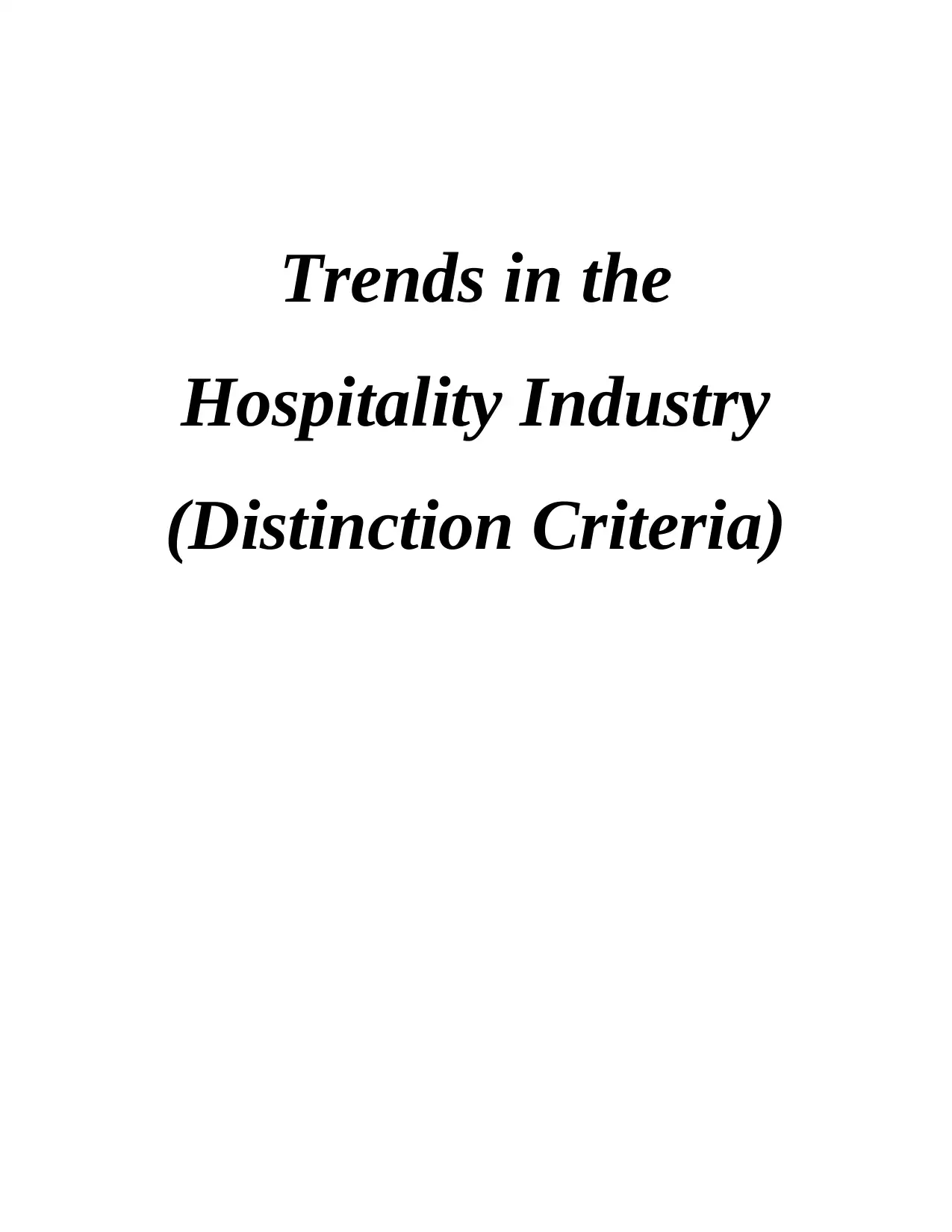
Trends in the
Hospitality Industry
(Distinction Criteria)
Hospitality Industry
(Distinction Criteria)
Paraphrase This Document
Need a fresh take? Get an instant paraphrase of this document with our AI Paraphraser
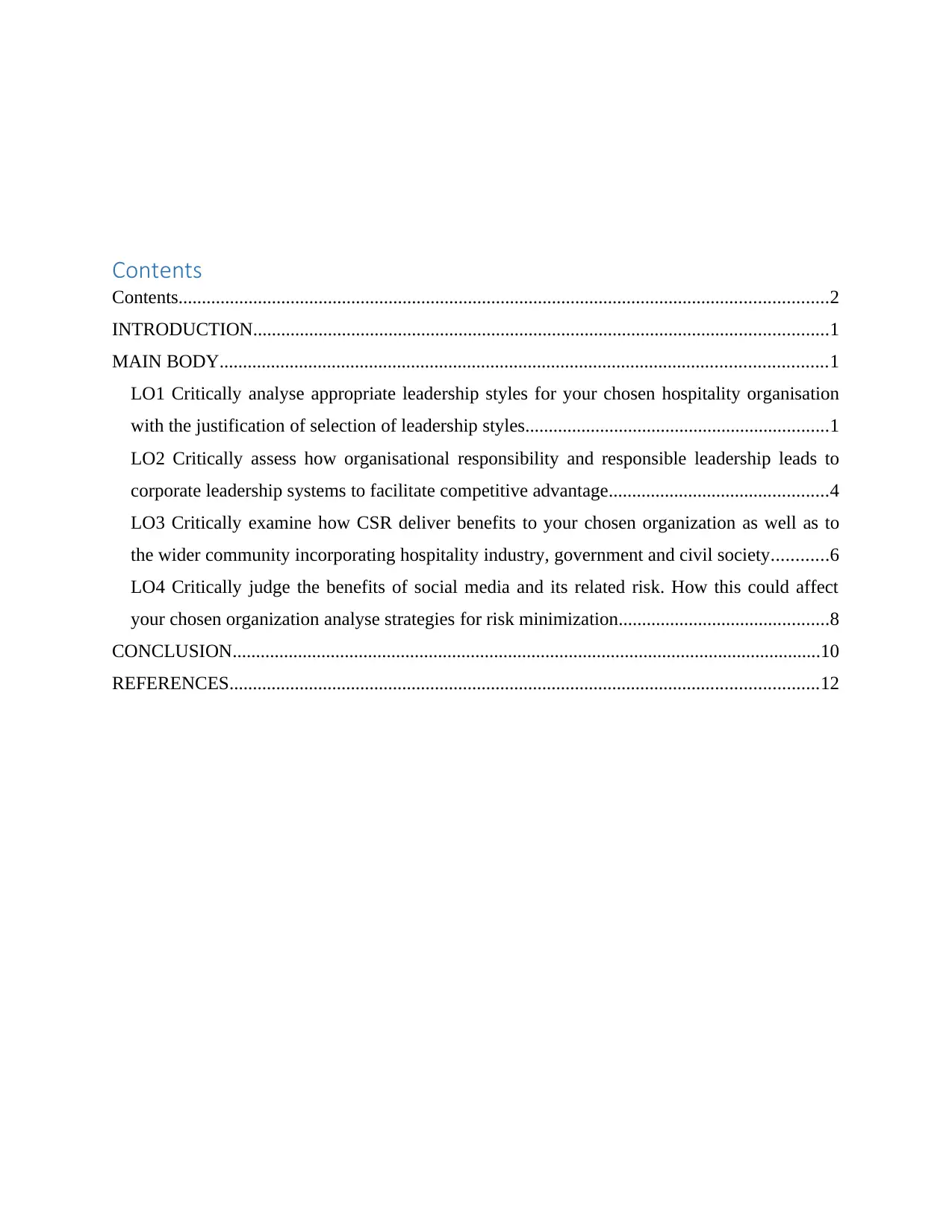
Contents
Contents...........................................................................................................................................2
INTRODUCTION...........................................................................................................................1
MAIN BODY..................................................................................................................................1
LO1 Critically analyse appropriate leadership styles for your chosen hospitality organisation
with the justification of selection of leadership styles.................................................................1
LO2 Critically assess how organisational responsibility and responsible leadership leads to
corporate leadership systems to facilitate competitive advantage...............................................4
LO3 Critically examine how CSR deliver benefits to your chosen organization as well as to
the wider community incorporating hospitality industry, government and civil society............6
LO4 Critically judge the benefits of social media and its related risk. How this could affect
your chosen organization analyse strategies for risk minimization.............................................8
CONCLUSION..............................................................................................................................10
REFERENCES..............................................................................................................................12
Contents...........................................................................................................................................2
INTRODUCTION...........................................................................................................................1
MAIN BODY..................................................................................................................................1
LO1 Critically analyse appropriate leadership styles for your chosen hospitality organisation
with the justification of selection of leadership styles.................................................................1
LO2 Critically assess how organisational responsibility and responsible leadership leads to
corporate leadership systems to facilitate competitive advantage...............................................4
LO3 Critically examine how CSR deliver benefits to your chosen organization as well as to
the wider community incorporating hospitality industry, government and civil society............6
LO4 Critically judge the benefits of social media and its related risk. How this could affect
your chosen organization analyse strategies for risk minimization.............................................8
CONCLUSION..............................................................................................................................10
REFERENCES..............................................................................................................................12

You're viewing a preview
Unlock full access by subscribing today!
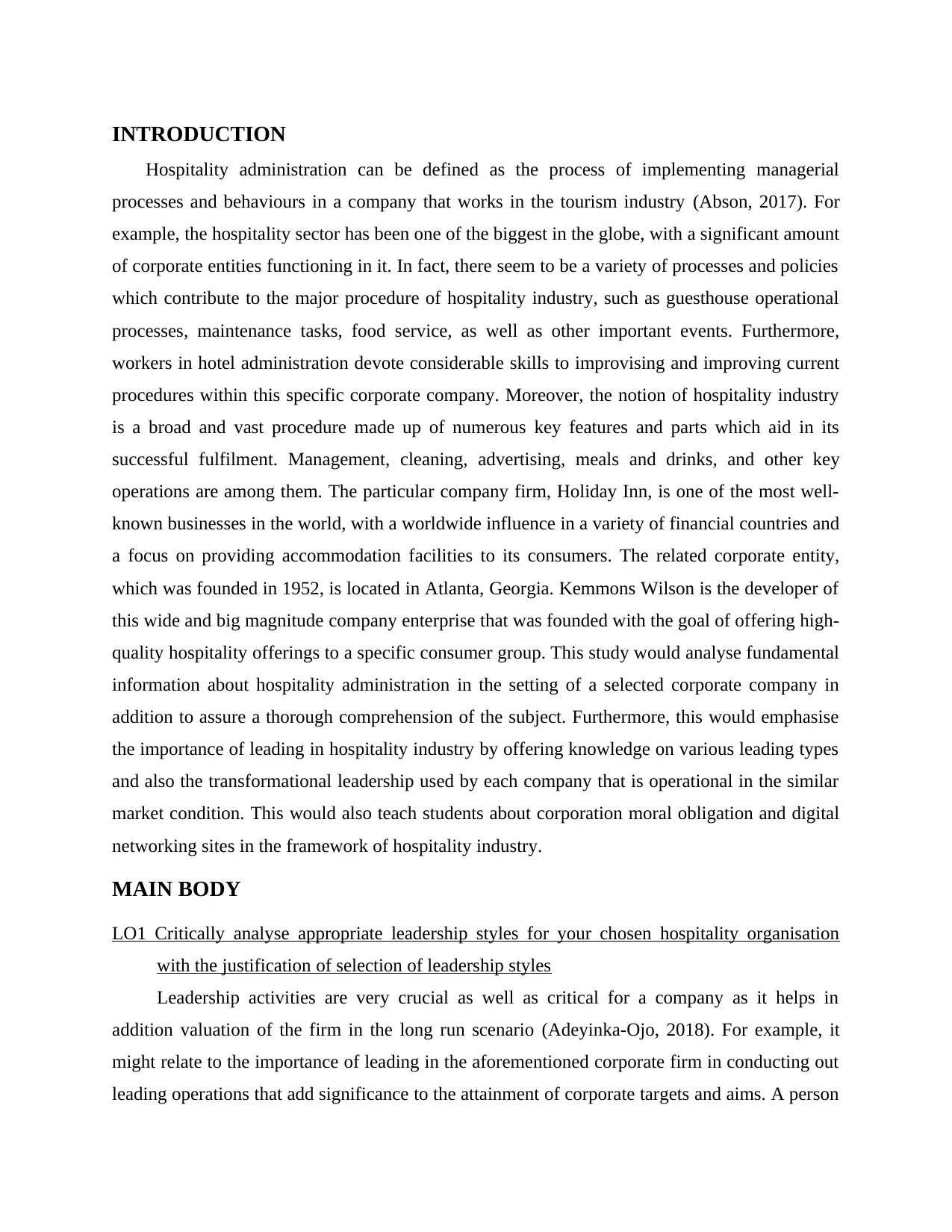
INTRODUCTION
Hospitality administration can be defined as the process of implementing managerial
processes and behaviours in a company that works in the tourism industry (Abson, 2017). For
example, the hospitality sector has been one of the biggest in the globe, with a significant amount
of corporate entities functioning in it. In fact, there seem to be a variety of processes and policies
which contribute to the major procedure of hospitality industry, such as guesthouse operational
processes, maintenance tasks, food service, as well as other important events. Furthermore,
workers in hotel administration devote considerable skills to improvising and improving current
procedures within this specific corporate company. Moreover, the notion of hospitality industry
is a broad and vast procedure made up of numerous key features and parts which aid in its
successful fulfilment. Management, cleaning, advertising, meals and drinks, and other key
operations are among them. The particular company firm, Holiday Inn, is one of the most well-
known businesses in the world, with a worldwide influence in a variety of financial countries and
a focus on providing accommodation facilities to its consumers. The related corporate entity,
which was founded in 1952, is located in Atlanta, Georgia. Kemmons Wilson is the developer of
this wide and big magnitude company enterprise that was founded with the goal of offering high-
quality hospitality offerings to a specific consumer group. This study would analyse fundamental
information about hospitality administration in the setting of a selected corporate company in
addition to assure a thorough comprehension of the subject. Furthermore, this would emphasise
the importance of leading in hospitality industry by offering knowledge on various leading types
and also the transformational leadership used by each company that is operational in the similar
market condition. This would also teach students about corporation moral obligation and digital
networking sites in the framework of hospitality industry.
MAIN BODY
LO1 Critically analyse appropriate leadership styles for your chosen hospitality organisation
with the justification of selection of leadership styles
Leadership activities are very crucial as well as critical for a company as it helps in
addition valuation of the firm in the long run scenario (Adeyinka-Ojo, 2018). For example, it
might relate to the importance of leading in the aforementioned corporate firm in conducting out
leading operations that add significance to the attainment of corporate targets and aims. A person
Hospitality administration can be defined as the process of implementing managerial
processes and behaviours in a company that works in the tourism industry (Abson, 2017). For
example, the hospitality sector has been one of the biggest in the globe, with a significant amount
of corporate entities functioning in it. In fact, there seem to be a variety of processes and policies
which contribute to the major procedure of hospitality industry, such as guesthouse operational
processes, maintenance tasks, food service, as well as other important events. Furthermore,
workers in hotel administration devote considerable skills to improvising and improving current
procedures within this specific corporate company. Moreover, the notion of hospitality industry
is a broad and vast procedure made up of numerous key features and parts which aid in its
successful fulfilment. Management, cleaning, advertising, meals and drinks, and other key
operations are among them. The particular company firm, Holiday Inn, is one of the most well-
known businesses in the world, with a worldwide influence in a variety of financial countries and
a focus on providing accommodation facilities to its consumers. The related corporate entity,
which was founded in 1952, is located in Atlanta, Georgia. Kemmons Wilson is the developer of
this wide and big magnitude company enterprise that was founded with the goal of offering high-
quality hospitality offerings to a specific consumer group. This study would analyse fundamental
information about hospitality administration in the setting of a selected corporate company in
addition to assure a thorough comprehension of the subject. Furthermore, this would emphasise
the importance of leading in hospitality industry by offering knowledge on various leading types
and also the transformational leadership used by each company that is operational in the similar
market condition. This would also teach students about corporation moral obligation and digital
networking sites in the framework of hospitality industry.
MAIN BODY
LO1 Critically analyse appropriate leadership styles for your chosen hospitality organisation
with the justification of selection of leadership styles
Leadership activities are very crucial as well as critical for a company as it helps in
addition valuation of the firm in the long run scenario (Adeyinka-Ojo, 2018). For example, it
might relate to the importance of leading in the aforementioned corporate firm in conducting out
leading operations that add significance to the attainment of corporate targets and aims. A person
Paraphrase This Document
Need a fresh take? Get an instant paraphrase of this document with our AI Paraphraser
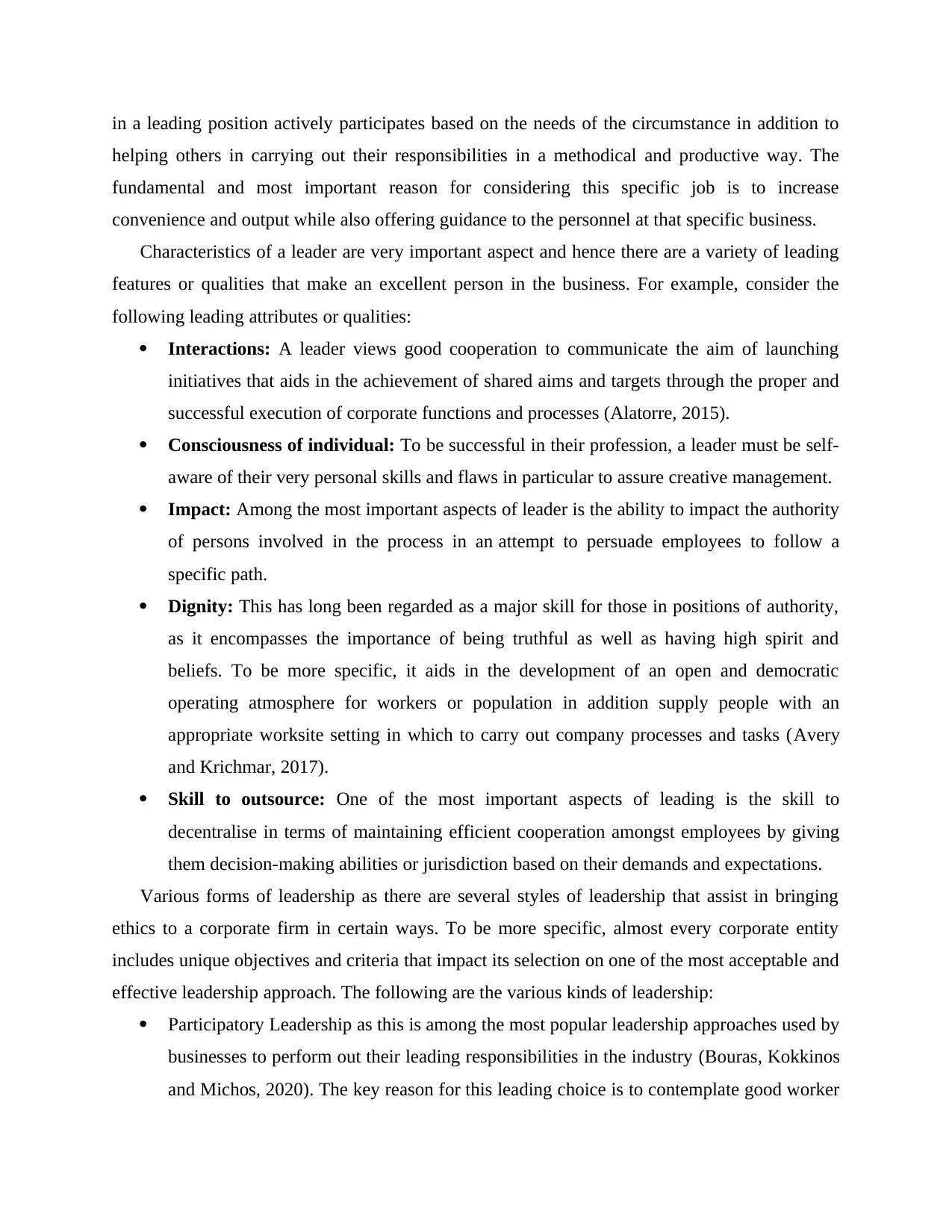
in a leading position actively participates based on the needs of the circumstance in addition to
helping others in carrying out their responsibilities in a methodical and productive way. The
fundamental and most important reason for considering this specific job is to increase
convenience and output while also offering guidance to the personnel at that specific business.
Characteristics of a leader are very important aspect and hence there are a variety of leading
features or qualities that make an excellent person in the business. For example, consider the
following leading attributes or qualities:
Interactions: A leader views good cooperation to communicate the aim of launching
initiatives that aids in the achievement of shared aims and targets through the proper and
successful execution of corporate functions and processes (Alatorre, 2015).
Consciousness of individual: To be successful in their profession, a leader must be self-
aware of their very personal skills and flaws in particular to assure creative management.
Impact: Among the most important aspects of leader is the ability to impact the authority
of persons involved in the process in an attempt to persuade employees to follow a
specific path.
Dignity: This has long been regarded as a major skill for those in positions of authority,
as it encompasses the importance of being truthful as well as having high spirit and
beliefs. To be more specific, it aids in the development of an open and democratic
operating atmosphere for workers or population in addition supply people with an
appropriate worksite setting in which to carry out company processes and tasks (Avery
and Krichmar, 2017).
Skill to outsource: One of the most important aspects of leading is the skill to
decentralise in terms of maintaining efficient cooperation amongst employees by giving
them decision-making abilities or jurisdiction based on their demands and expectations.
Various forms of leadership as there are several styles of leadership that assist in bringing
ethics to a corporate firm in certain ways. To be more specific, almost every corporate entity
includes unique objectives and criteria that impact its selection on one of the most acceptable and
effective leadership approach. The following are the various kinds of leadership:
Participatory Leadership as this is among the most popular leadership approaches used by
businesses to perform out their leading responsibilities in the industry (Bouras, Kokkinos
and Michos, 2020). The key reason for this leading choice is to contemplate good worker
helping others in carrying out their responsibilities in a methodical and productive way. The
fundamental and most important reason for considering this specific job is to increase
convenience and output while also offering guidance to the personnel at that specific business.
Characteristics of a leader are very important aspect and hence there are a variety of leading
features or qualities that make an excellent person in the business. For example, consider the
following leading attributes or qualities:
Interactions: A leader views good cooperation to communicate the aim of launching
initiatives that aids in the achievement of shared aims and targets through the proper and
successful execution of corporate functions and processes (Alatorre, 2015).
Consciousness of individual: To be successful in their profession, a leader must be self-
aware of their very personal skills and flaws in particular to assure creative management.
Impact: Among the most important aspects of leader is the ability to impact the authority
of persons involved in the process in an attempt to persuade employees to follow a
specific path.
Dignity: This has long been regarded as a major skill for those in positions of authority,
as it encompasses the importance of being truthful as well as having high spirit and
beliefs. To be more specific, it aids in the development of an open and democratic
operating atmosphere for workers or population in addition supply people with an
appropriate worksite setting in which to carry out company processes and tasks (Avery
and Krichmar, 2017).
Skill to outsource: One of the most important aspects of leading is the skill to
decentralise in terms of maintaining efficient cooperation amongst employees by giving
them decision-making abilities or jurisdiction based on their demands and expectations.
Various forms of leadership as there are several styles of leadership that assist in bringing
ethics to a corporate firm in certain ways. To be more specific, almost every corporate entity
includes unique objectives and criteria that impact its selection on one of the most acceptable and
effective leadership approach. The following are the various kinds of leadership:
Participatory Leadership as this is among the most popular leadership approaches used by
businesses to perform out their leading responsibilities in the industry (Bouras, Kokkinos
and Michos, 2020). The key reason for this leading choice is to contemplate good worker
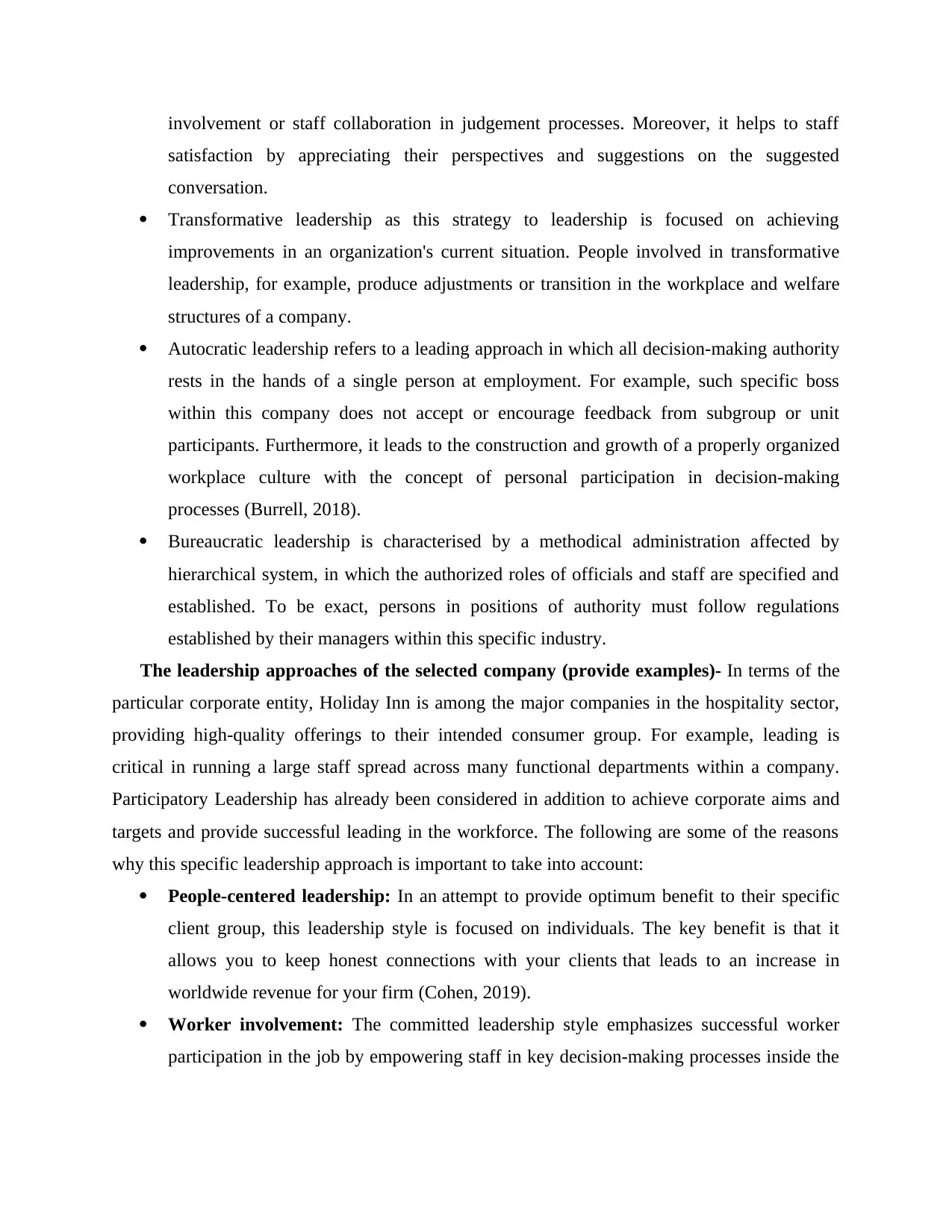
involvement or staff collaboration in judgement processes. Moreover, it helps to staff
satisfaction by appreciating their perspectives and suggestions on the suggested
conversation.
Transformative leadership as this strategy to leadership is focused on achieving
improvements in an organization's current situation. People involved in transformative
leadership, for example, produce adjustments or transition in the workplace and welfare
structures of a company.
Autocratic leadership refers to a leading approach in which all decision-making authority
rests in the hands of a single person at employment. For example, such specific boss
within this company does not accept or encourage feedback from subgroup or unit
participants. Furthermore, it leads to the construction and growth of a properly organized
workplace culture with the concept of personal participation in decision-making
processes (Burrell, 2018).
Bureaucratic leadership is characterised by a methodical administration affected by
hierarchical system, in which the authorized roles of officials and staff are specified and
established. To be exact, persons in positions of authority must follow regulations
established by their managers within this specific industry.
The leadership approaches of the selected company (provide examples)- In terms of the
particular corporate entity, Holiday Inn is among the major companies in the hospitality sector,
providing high-quality offerings to their intended consumer group. For example, leading is
critical in running a large staff spread across many functional departments within a company.
Participatory Leadership has already been considered in addition to achieve corporate aims and
targets and provide successful leading in the workforce. The following are some of the reasons
why this specific leadership approach is important to take into account:
People-centered leadership: In an attempt to provide optimum benefit to their specific
client group, this leadership style is focused on individuals. The key benefit is that it
allows you to keep honest connections with your clients that leads to an increase in
worldwide revenue for your firm (Cohen, 2019).
Worker involvement: The committed leadership style emphasizes successful worker
participation in the job by empowering staff in key decision-making processes inside the
satisfaction by appreciating their perspectives and suggestions on the suggested
conversation.
Transformative leadership as this strategy to leadership is focused on achieving
improvements in an organization's current situation. People involved in transformative
leadership, for example, produce adjustments or transition in the workplace and welfare
structures of a company.
Autocratic leadership refers to a leading approach in which all decision-making authority
rests in the hands of a single person at employment. For example, such specific boss
within this company does not accept or encourage feedback from subgroup or unit
participants. Furthermore, it leads to the construction and growth of a properly organized
workplace culture with the concept of personal participation in decision-making
processes (Burrell, 2018).
Bureaucratic leadership is characterised by a methodical administration affected by
hierarchical system, in which the authorized roles of officials and staff are specified and
established. To be exact, persons in positions of authority must follow regulations
established by their managers within this specific industry.
The leadership approaches of the selected company (provide examples)- In terms of the
particular corporate entity, Holiday Inn is among the major companies in the hospitality sector,
providing high-quality offerings to their intended consumer group. For example, leading is
critical in running a large staff spread across many functional departments within a company.
Participatory Leadership has already been considered in addition to achieve corporate aims and
targets and provide successful leading in the workforce. The following are some of the reasons
why this specific leadership approach is important to take into account:
People-centered leadership: In an attempt to provide optimum benefit to their specific
client group, this leadership style is focused on individuals. The key benefit is that it
allows you to keep honest connections with your clients that leads to an increase in
worldwide revenue for your firm (Cohen, 2019).
Worker involvement: The committed leadership style emphasizes successful worker
participation in the job by empowering staff in key decision-making processes inside the
You're viewing a preview
Unlock full access by subscribing today!
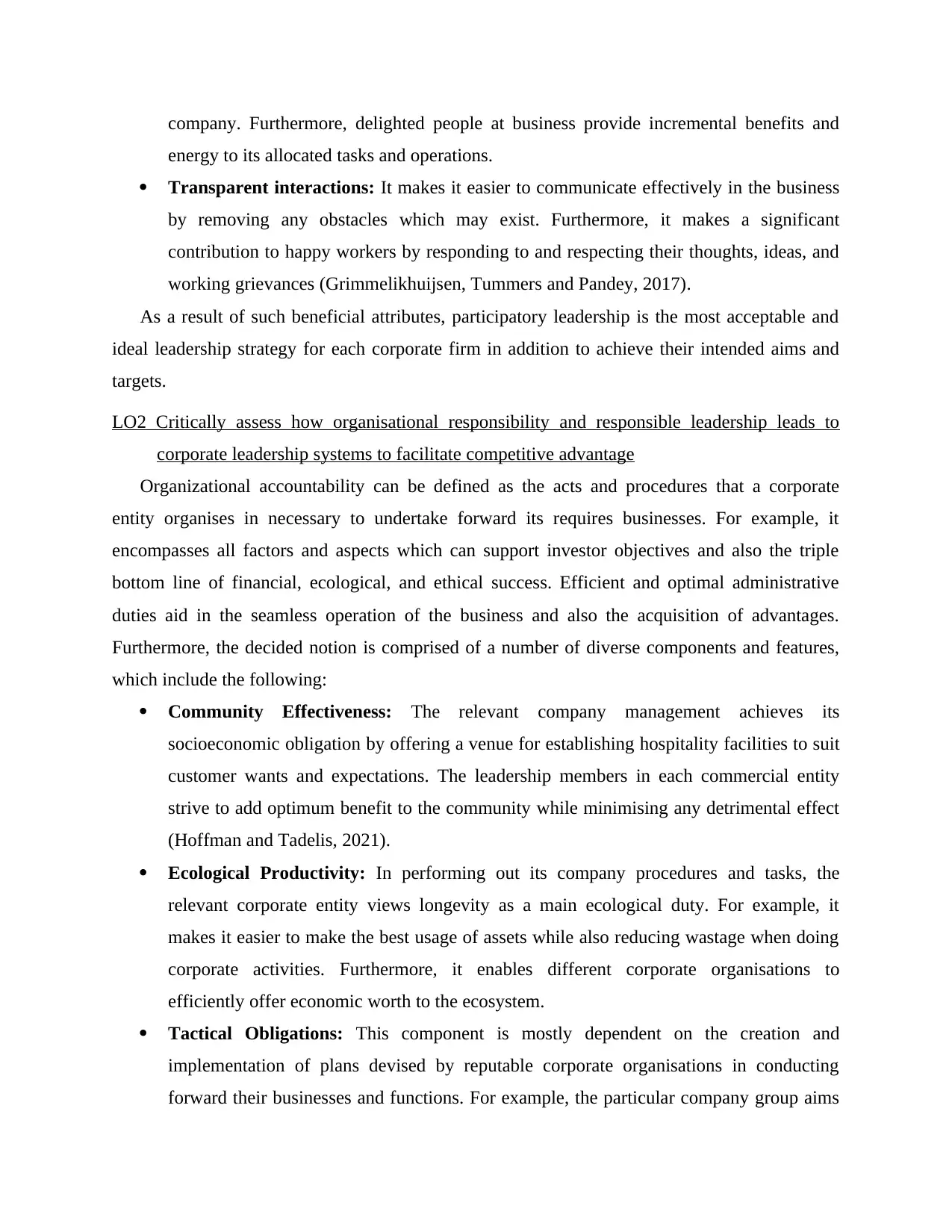
company. Furthermore, delighted people at business provide incremental benefits and
energy to its allocated tasks and operations.
Transparent interactions: It makes it easier to communicate effectively in the business
by removing any obstacles which may exist. Furthermore, it makes a significant
contribution to happy workers by responding to and respecting their thoughts, ideas, and
working grievances (Grimmelikhuijsen, Tummers and Pandey, 2017).
As a result of such beneficial attributes, participatory leadership is the most acceptable and
ideal leadership strategy for each corporate firm in addition to achieve their intended aims and
targets.
LO2 Critically assess how organisational responsibility and responsible leadership leads to
corporate leadership systems to facilitate competitive advantage
Organizational accountability can be defined as the acts and procedures that a corporate
entity organises in necessary to undertake forward its requires businesses. For example, it
encompasses all factors and aspects which can support investor objectives and also the triple
bottom line of financial, ecological, and ethical success. Efficient and optimal administrative
duties aid in the seamless operation of the business and also the acquisition of advantages.
Furthermore, the decided notion is comprised of a number of diverse components and features,
which include the following:
Community Effectiveness: The relevant company management achieves its
socioeconomic obligation by offering a venue for establishing hospitality facilities to suit
customer wants and expectations. The leadership members in each commercial entity
strive to add optimum benefit to the community while minimising any detrimental effect
(Hoffman and Tadelis, 2021).
Ecological Productivity: In performing out its company procedures and tasks, the
relevant corporate entity views longevity as a main ecological duty. For example, it
makes it easier to make the best usage of assets while also reducing wastage when doing
corporate activities. Furthermore, it enables different corporate organisations to
efficiently offer economic worth to the ecosystem.
Tactical Obligations: This component is mostly dependent on the creation and
implementation of plans devised by reputable corporate organisations in conducting
forward their businesses and functions. For example, the particular company group aims
energy to its allocated tasks and operations.
Transparent interactions: It makes it easier to communicate effectively in the business
by removing any obstacles which may exist. Furthermore, it makes a significant
contribution to happy workers by responding to and respecting their thoughts, ideas, and
working grievances (Grimmelikhuijsen, Tummers and Pandey, 2017).
As a result of such beneficial attributes, participatory leadership is the most acceptable and
ideal leadership strategy for each corporate firm in addition to achieve their intended aims and
targets.
LO2 Critically assess how organisational responsibility and responsible leadership leads to
corporate leadership systems to facilitate competitive advantage
Organizational accountability can be defined as the acts and procedures that a corporate
entity organises in necessary to undertake forward its requires businesses. For example, it
encompasses all factors and aspects which can support investor objectives and also the triple
bottom line of financial, ecological, and ethical success. Efficient and optimal administrative
duties aid in the seamless operation of the business and also the acquisition of advantages.
Furthermore, the decided notion is comprised of a number of diverse components and features,
which include the following:
Community Effectiveness: The relevant company management achieves its
socioeconomic obligation by offering a venue for establishing hospitality facilities to suit
customer wants and expectations. The leadership members in each commercial entity
strive to add optimum benefit to the community while minimising any detrimental effect
(Hoffman and Tadelis, 2021).
Ecological Productivity: In performing out its company procedures and tasks, the
relevant corporate entity views longevity as a main ecological duty. For example, it
makes it easier to make the best usage of assets while also reducing wastage when doing
corporate activities. Furthermore, it enables different corporate organisations to
efficiently offer economic worth to the ecosystem.
Tactical Obligations: This component is mostly dependent on the creation and
implementation of plans devised by reputable corporate organisations in conducting
forward their businesses and functions. For example, the particular company group aims
Paraphrase This Document
Need a fresh take? Get an instant paraphrase of this document with our AI Paraphraser
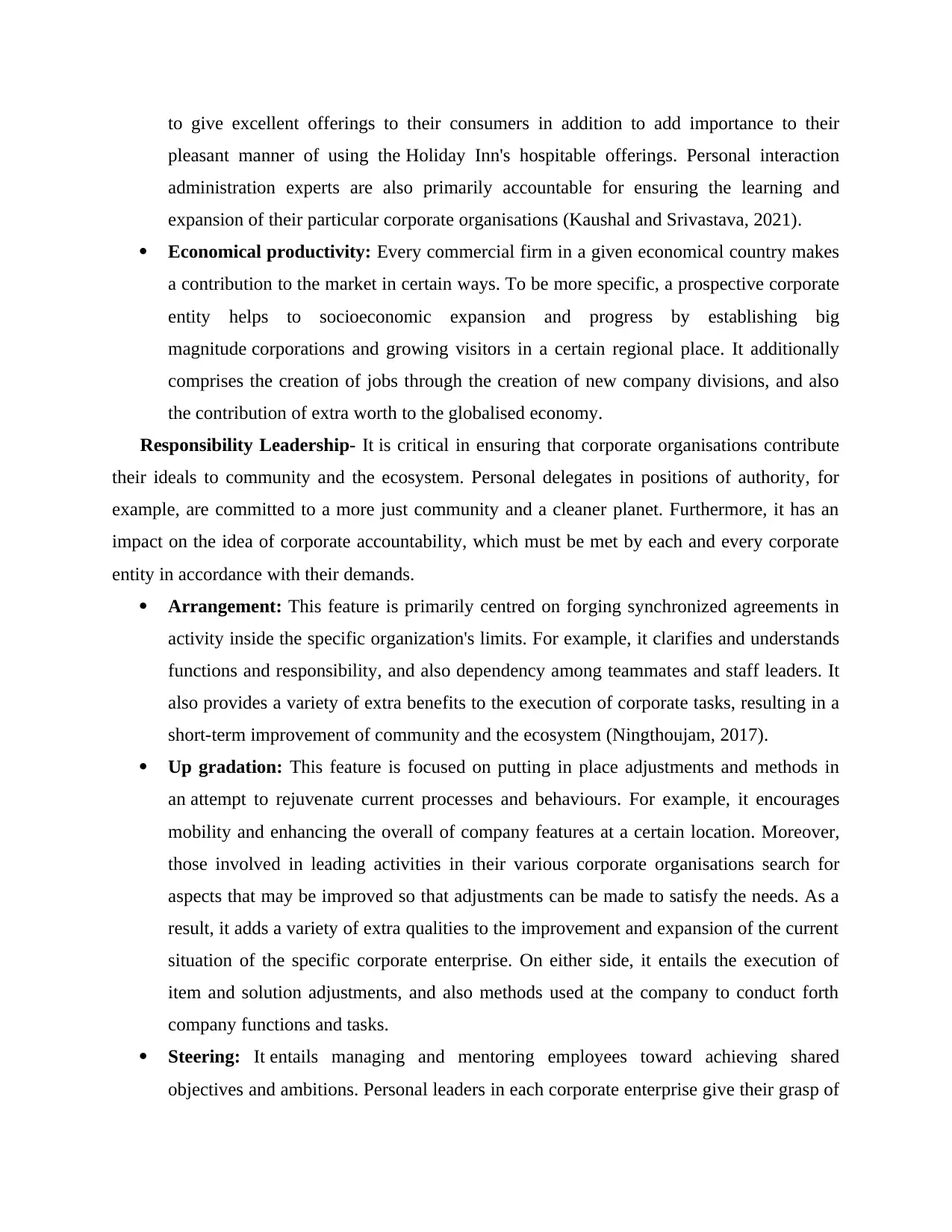
to give excellent offerings to their consumers in addition to add importance to their
pleasant manner of using the Holiday Inn's hospitable offerings. Personal interaction
administration experts are also primarily accountable for ensuring the learning and
expansion of their particular corporate organisations (Kaushal and Srivastava, 2021).
Economical productivity: Every commercial firm in a given economical country makes
a contribution to the market in certain ways. To be more specific, a prospective corporate
entity helps to socioeconomic expansion and progress by establishing big
magnitude corporations and growing visitors in a certain regional place. It additionally
comprises the creation of jobs through the creation of new company divisions, and also
the contribution of extra worth to the globalised economy.
Responsibility Leadership- It is critical in ensuring that corporate organisations contribute
their ideals to community and the ecosystem. Personal delegates in positions of authority, for
example, are committed to a more just community and a cleaner planet. Furthermore, it has an
impact on the idea of corporate accountability, which must be met by each and every corporate
entity in accordance with their demands.
Arrangement: This feature is primarily centred on forging synchronized agreements in
activity inside the specific organization's limits. For example, it clarifies and understands
functions and responsibility, and also dependency among teammates and staff leaders. It
also provides a variety of extra benefits to the execution of corporate tasks, resulting in a
short-term improvement of community and the ecosystem (Ningthoujam, 2017).
Up gradation: This feature is focused on putting in place adjustments and methods in
an attempt to rejuvenate current processes and behaviours. For example, it encourages
mobility and enhancing the overall of company features at a certain location. Moreover,
those involved in leading activities in their various corporate organisations search for
aspects that may be improved so that adjustments can be made to satisfy the needs. As a
result, it adds a variety of extra qualities to the improvement and expansion of the current
situation of the specific corporate enterprise. On either side, it entails the execution of
item and solution adjustments, and also methods used at the company to conduct forth
company functions and tasks.
Steering: It entails managing and mentoring employees toward achieving shared
objectives and ambitions. Personal leaders in each corporate enterprise give their grasp of
pleasant manner of using the Holiday Inn's hospitable offerings. Personal interaction
administration experts are also primarily accountable for ensuring the learning and
expansion of their particular corporate organisations (Kaushal and Srivastava, 2021).
Economical productivity: Every commercial firm in a given economical country makes
a contribution to the market in certain ways. To be more specific, a prospective corporate
entity helps to socioeconomic expansion and progress by establishing big
magnitude corporations and growing visitors in a certain regional place. It additionally
comprises the creation of jobs through the creation of new company divisions, and also
the contribution of extra worth to the globalised economy.
Responsibility Leadership- It is critical in ensuring that corporate organisations contribute
their ideals to community and the ecosystem. Personal delegates in positions of authority, for
example, are committed to a more just community and a cleaner planet. Furthermore, it has an
impact on the idea of corporate accountability, which must be met by each and every corporate
entity in accordance with their demands.
Arrangement: This feature is primarily centred on forging synchronized agreements in
activity inside the specific organization's limits. For example, it clarifies and understands
functions and responsibility, and also dependency among teammates and staff leaders. It
also provides a variety of extra benefits to the execution of corporate tasks, resulting in a
short-term improvement of community and the ecosystem (Ningthoujam, 2017).
Up gradation: This feature is focused on putting in place adjustments and methods in
an attempt to rejuvenate current processes and behaviours. For example, it encourages
mobility and enhancing the overall of company features at a certain location. Moreover,
those involved in leading activities in their various corporate organisations search for
aspects that may be improved so that adjustments can be made to satisfy the needs. As a
result, it adds a variety of extra qualities to the improvement and expansion of the current
situation of the specific corporate enterprise. On either side, it entails the execution of
item and solution adjustments, and also methods used at the company to conduct forth
company functions and tasks.
Steering: It entails managing and mentoring employees toward achieving shared
objectives and ambitions. Personal leaders in each corporate enterprise give their grasp of
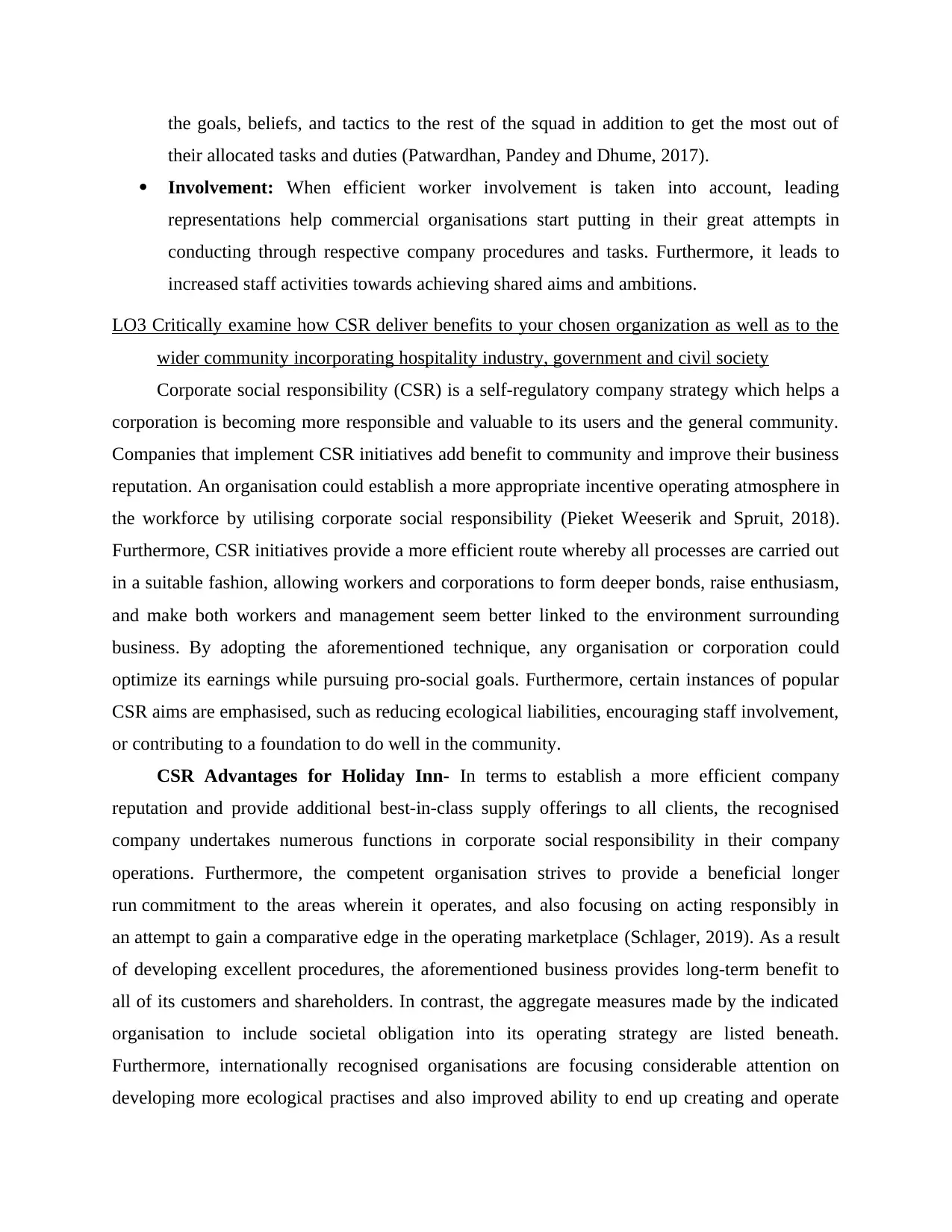
the goals, beliefs, and tactics to the rest of the squad in addition to get the most out of
their allocated tasks and duties (Patwardhan, Pandey and Dhume, 2017).
Involvement: When efficient worker involvement is taken into account, leading
representations help commercial organisations start putting in their great attempts in
conducting through respective company procedures and tasks. Furthermore, it leads to
increased staff activities towards achieving shared aims and ambitions.
LO3 Critically examine how CSR deliver benefits to your chosen organization as well as to the
wider community incorporating hospitality industry, government and civil society
Corporate social responsibility (CSR) is a self-regulatory company strategy which helps a
corporation is becoming more responsible and valuable to its users and the general community.
Companies that implement CSR initiatives add benefit to community and improve their business
reputation. An organisation could establish a more appropriate incentive operating atmosphere in
the workforce by utilising corporate social responsibility (Pieket Weeserik and Spruit, 2018).
Furthermore, CSR initiatives provide a more efficient route whereby all processes are carried out
in a suitable fashion, allowing workers and corporations to form deeper bonds, raise enthusiasm,
and make both workers and management seem better linked to the environment surrounding
business. By adopting the aforementioned technique, any organisation or corporation could
optimize its earnings while pursuing pro-social goals. Furthermore, certain instances of popular
CSR aims are emphasised, such as reducing ecological liabilities, encouraging staff involvement,
or contributing to a foundation to do well in the community.
CSR Advantages for Holiday Inn- In terms to establish a more efficient company
reputation and provide additional best-in-class supply offerings to all clients, the recognised
company undertakes numerous functions in corporate social responsibility in their company
operations. Furthermore, the competent organisation strives to provide a beneficial longer
run commitment to the areas wherein it operates, and also focusing on acting responsibly in
an attempt to gain a comparative edge in the operating marketplace (Schlager, 2019). As a result
of developing excellent procedures, the aforementioned business provides long-term benefit to
all of its customers and shareholders. In contrast, the aggregate measures made by the indicated
organisation to include societal obligation into its operating strategy are listed beneath.
Furthermore, internationally recognised organisations are focusing considerable attention on
developing more ecological practises and also improved ability to end up creating and operate
their allocated tasks and duties (Patwardhan, Pandey and Dhume, 2017).
Involvement: When efficient worker involvement is taken into account, leading
representations help commercial organisations start putting in their great attempts in
conducting through respective company procedures and tasks. Furthermore, it leads to
increased staff activities towards achieving shared aims and ambitions.
LO3 Critically examine how CSR deliver benefits to your chosen organization as well as to the
wider community incorporating hospitality industry, government and civil society
Corporate social responsibility (CSR) is a self-regulatory company strategy which helps a
corporation is becoming more responsible and valuable to its users and the general community.
Companies that implement CSR initiatives add benefit to community and improve their business
reputation. An organisation could establish a more appropriate incentive operating atmosphere in
the workforce by utilising corporate social responsibility (Pieket Weeserik and Spruit, 2018).
Furthermore, CSR initiatives provide a more efficient route whereby all processes are carried out
in a suitable fashion, allowing workers and corporations to form deeper bonds, raise enthusiasm,
and make both workers and management seem better linked to the environment surrounding
business. By adopting the aforementioned technique, any organisation or corporation could
optimize its earnings while pursuing pro-social goals. Furthermore, certain instances of popular
CSR aims are emphasised, such as reducing ecological liabilities, encouraging staff involvement,
or contributing to a foundation to do well in the community.
CSR Advantages for Holiday Inn- In terms to establish a more efficient company
reputation and provide additional best-in-class supply offerings to all clients, the recognised
company undertakes numerous functions in corporate social responsibility in their company
operations. Furthermore, the competent organisation strives to provide a beneficial longer
run commitment to the areas wherein it operates, and also focusing on acting responsibly in
an attempt to gain a comparative edge in the operating marketplace (Schlager, 2019). As a result
of developing excellent procedures, the aforementioned business provides long-term benefit to
all of its customers and shareholders. In contrast, the aggregate measures made by the indicated
organisation to include societal obligation into its operating strategy are listed beneath.
Furthermore, internationally recognised organisations are focusing considerable attention on
developing more ecological practises and also improved ability to end up creating and operate
You're viewing a preview
Unlock full access by subscribing today!
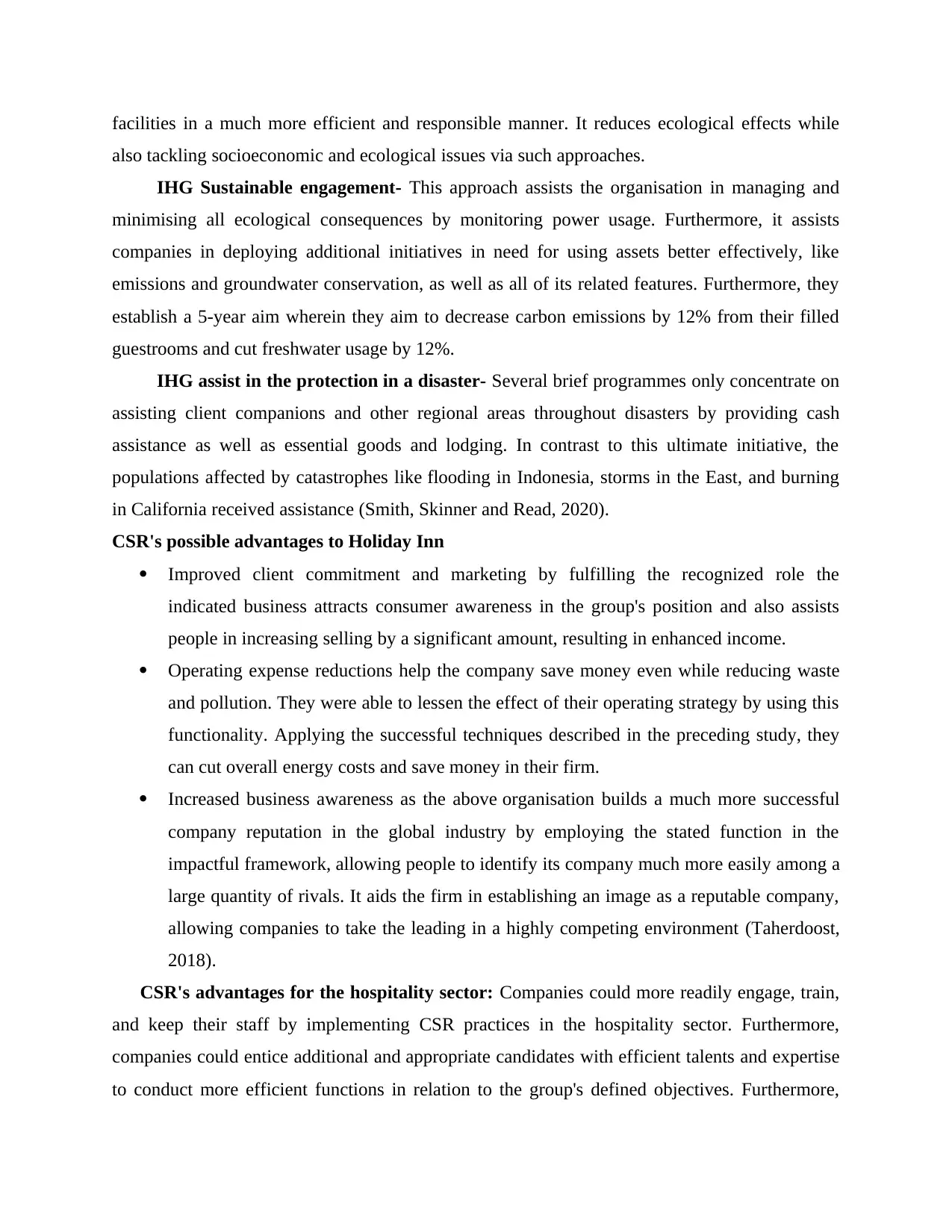
facilities in a much more efficient and responsible manner. It reduces ecological effects while
also tackling socioeconomic and ecological issues via such approaches.
IHG Sustainable engagement- This approach assists the organisation in managing and
minimising all ecological consequences by monitoring power usage. Furthermore, it assists
companies in deploying additional initiatives in need for using assets better effectively, like
emissions and groundwater conservation, as well as all of its related features. Furthermore, they
establish a 5-year aim wherein they aim to decrease carbon emissions by 12% from their filled
guestrooms and cut freshwater usage by 12%.
IHG assist in the protection in a disaster- Several brief programmes only concentrate on
assisting client companions and other regional areas throughout disasters by providing cash
assistance as well as essential goods and lodging. In contrast to this ultimate initiative, the
populations affected by catastrophes like flooding in Indonesia, storms in the East, and burning
in California received assistance (Smith, Skinner and Read, 2020).
CSR's possible advantages to Holiday Inn
Improved client commitment and marketing by fulfilling the recognized role the
indicated business attracts consumer awareness in the group's position and also assists
people in increasing selling by a significant amount, resulting in enhanced income.
Operating expense reductions help the company save money even while reducing waste
and pollution. They were able to lessen the effect of their operating strategy by using this
functionality. Applying the successful techniques described in the preceding study, they
can cut overall energy costs and save money in their firm.
Increased business awareness as the above organisation builds a much more successful
company reputation in the global industry by employing the stated function in the
impactful framework, allowing people to identify its company much more easily among a
large quantity of rivals. It aids the firm in establishing an image as a reputable company,
allowing companies to take the leading in a highly competing environment (Taherdoost,
2018).
CSR's advantages for the hospitality sector: Companies could more readily engage, train,
and keep their staff by implementing CSR practices in the hospitality sector. Furthermore,
companies could entice additional and appropriate candidates with efficient talents and expertise
to conduct more efficient functions in relation to the group's defined objectives. Furthermore,
also tackling socioeconomic and ecological issues via such approaches.
IHG Sustainable engagement- This approach assists the organisation in managing and
minimising all ecological consequences by monitoring power usage. Furthermore, it assists
companies in deploying additional initiatives in need for using assets better effectively, like
emissions and groundwater conservation, as well as all of its related features. Furthermore, they
establish a 5-year aim wherein they aim to decrease carbon emissions by 12% from their filled
guestrooms and cut freshwater usage by 12%.
IHG assist in the protection in a disaster- Several brief programmes only concentrate on
assisting client companions and other regional areas throughout disasters by providing cash
assistance as well as essential goods and lodging. In contrast to this ultimate initiative, the
populations affected by catastrophes like flooding in Indonesia, storms in the East, and burning
in California received assistance (Smith, Skinner and Read, 2020).
CSR's possible advantages to Holiday Inn
Improved client commitment and marketing by fulfilling the recognized role the
indicated business attracts consumer awareness in the group's position and also assists
people in increasing selling by a significant amount, resulting in enhanced income.
Operating expense reductions help the company save money even while reducing waste
and pollution. They were able to lessen the effect of their operating strategy by using this
functionality. Applying the successful techniques described in the preceding study, they
can cut overall energy costs and save money in their firm.
Increased business awareness as the above organisation builds a much more successful
company reputation in the global industry by employing the stated function in the
impactful framework, allowing people to identify its company much more easily among a
large quantity of rivals. It aids the firm in establishing an image as a reputable company,
allowing companies to take the leading in a highly competing environment (Taherdoost,
2018).
CSR's advantages for the hospitality sector: Companies could more readily engage, train,
and keep their staff by implementing CSR practices in the hospitality sector. Furthermore,
companies could entice additional and appropriate candidates with efficient talents and expertise
to conduct more efficient functions in relation to the group's defined objectives. Furthermore,
Paraphrase This Document
Need a fresh take? Get an instant paraphrase of this document with our AI Paraphraser
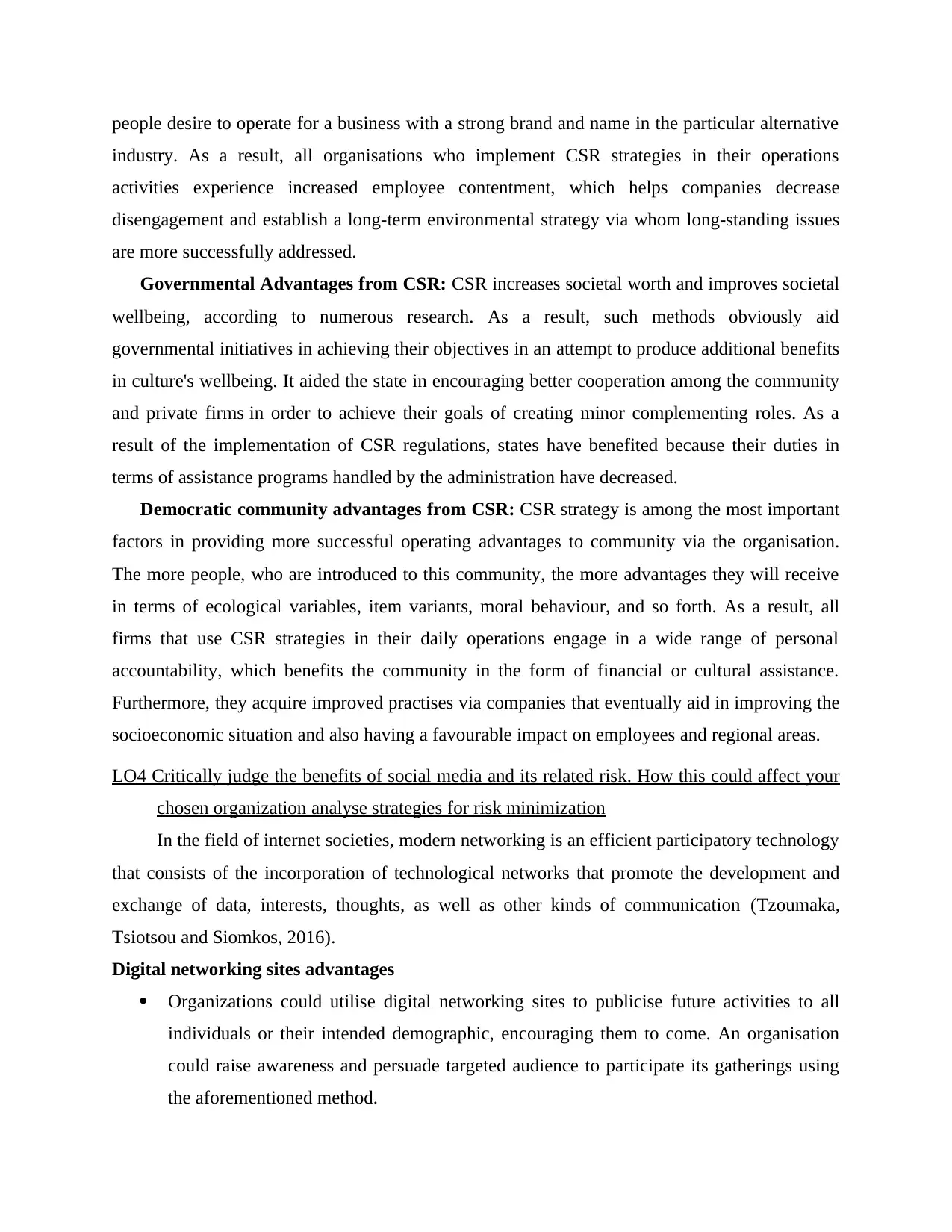
people desire to operate for a business with a strong brand and name in the particular alternative
industry. As a result, all organisations who implement CSR strategies in their operations
activities experience increased employee contentment, which helps companies decrease
disengagement and establish a long-term environmental strategy via whom long-standing issues
are more successfully addressed.
Governmental Advantages from CSR: CSR increases societal worth and improves societal
wellbeing, according to numerous research. As a result, such methods obviously aid
governmental initiatives in achieving their objectives in an attempt to produce additional benefits
in culture's wellbeing. It aided the state in encouraging better cooperation among the community
and private firms in order to achieve their goals of creating minor complementing roles. As a
result of the implementation of CSR regulations, states have benefited because their duties in
terms of assistance programs handled by the administration have decreased.
Democratic community advantages from CSR: CSR strategy is among the most important
factors in providing more successful operating advantages to community via the organisation.
The more people, who are introduced to this community, the more advantages they will receive
in terms of ecological variables, item variants, moral behaviour, and so forth. As a result, all
firms that use CSR strategies in their daily operations engage in a wide range of personal
accountability, which benefits the community in the form of financial or cultural assistance.
Furthermore, they acquire improved practises via companies that eventually aid in improving the
socioeconomic situation and also having a favourable impact on employees and regional areas.
LO4 Critically judge the benefits of social media and its related risk. How this could affect your
chosen organization analyse strategies for risk minimization
In the field of internet societies, modern networking is an efficient participatory technology
that consists of the incorporation of technological networks that promote the development and
exchange of data, interests, thoughts, as well as other kinds of communication (Tzoumaka,
Tsiotsou and Siomkos, 2016).
Digital networking sites advantages
Organizations could utilise digital networking sites to publicise future activities to all
individuals or their intended demographic, encouraging them to come. An organisation
could raise awareness and persuade targeted audience to participate its gatherings using
the aforementioned method.
industry. As a result, all organisations who implement CSR strategies in their operations
activities experience increased employee contentment, which helps companies decrease
disengagement and establish a long-term environmental strategy via whom long-standing issues
are more successfully addressed.
Governmental Advantages from CSR: CSR increases societal worth and improves societal
wellbeing, according to numerous research. As a result, such methods obviously aid
governmental initiatives in achieving their objectives in an attempt to produce additional benefits
in culture's wellbeing. It aided the state in encouraging better cooperation among the community
and private firms in order to achieve their goals of creating minor complementing roles. As a
result of the implementation of CSR regulations, states have benefited because their duties in
terms of assistance programs handled by the administration have decreased.
Democratic community advantages from CSR: CSR strategy is among the most important
factors in providing more successful operating advantages to community via the organisation.
The more people, who are introduced to this community, the more advantages they will receive
in terms of ecological variables, item variants, moral behaviour, and so forth. As a result, all
firms that use CSR strategies in their daily operations engage in a wide range of personal
accountability, which benefits the community in the form of financial or cultural assistance.
Furthermore, they acquire improved practises via companies that eventually aid in improving the
socioeconomic situation and also having a favourable impact on employees and regional areas.
LO4 Critically judge the benefits of social media and its related risk. How this could affect your
chosen organization analyse strategies for risk minimization
In the field of internet societies, modern networking is an efficient participatory technology
that consists of the incorporation of technological networks that promote the development and
exchange of data, interests, thoughts, as well as other kinds of communication (Tzoumaka,
Tsiotsou and Siomkos, 2016).
Digital networking sites advantages
Organizations could utilise digital networking sites to publicise future activities to all
individuals or their intended demographic, encouraging them to come. An organisation
could raise awareness and persuade targeted audience to participate its gatherings using
the aforementioned method.
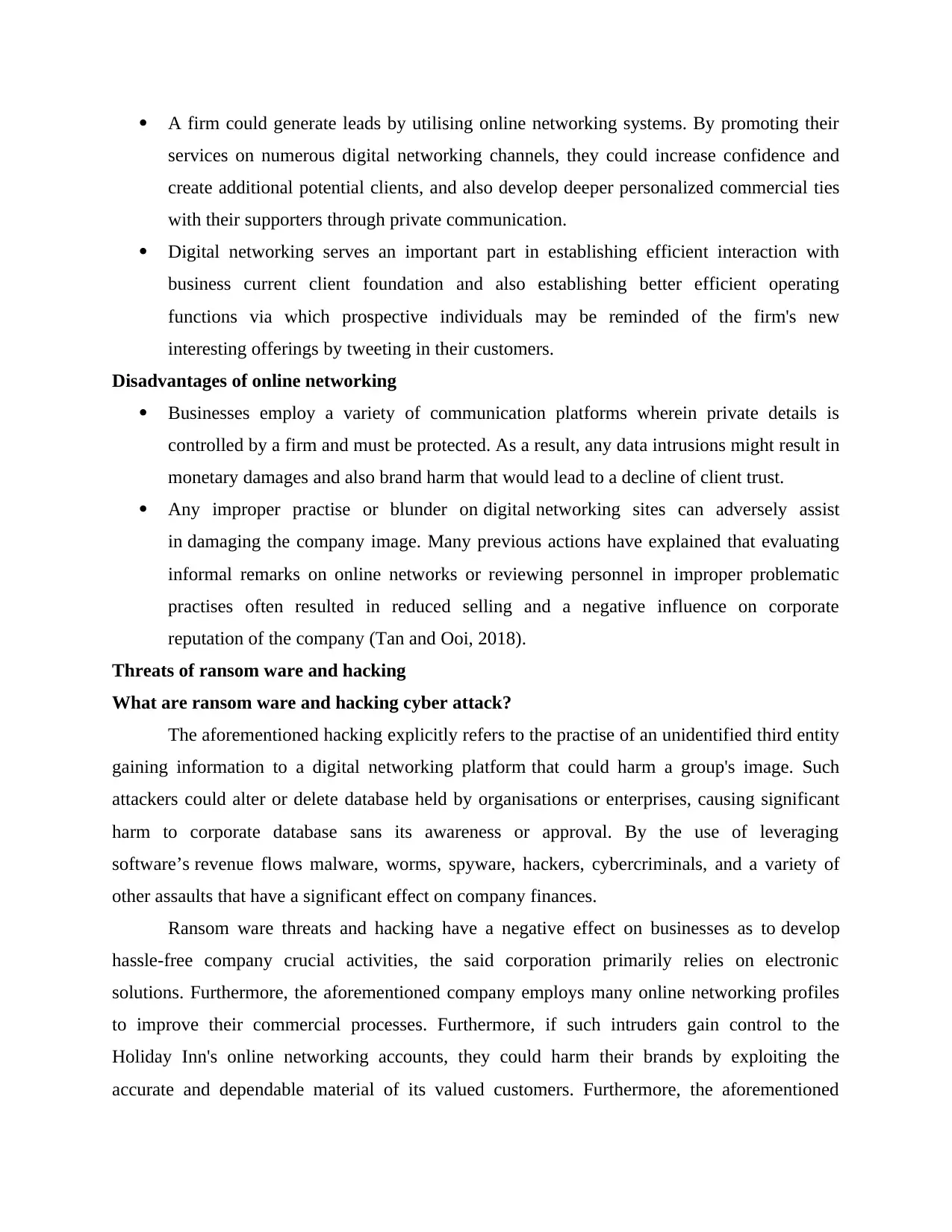
A firm could generate leads by utilising online networking systems. By promoting their
services on numerous digital networking channels, they could increase confidence and
create additional potential clients, and also develop deeper personalized commercial ties
with their supporters through private communication.
Digital networking serves an important part in establishing efficient interaction with
business current client foundation and also establishing better efficient operating
functions via which prospective individuals may be reminded of the firm's new
interesting offerings by tweeting in their customers.
Disadvantages of online networking
Businesses employ a variety of communication platforms wherein private details is
controlled by a firm and must be protected. As a result, any data intrusions might result in
monetary damages and also brand harm that would lead to a decline of client trust.
Any improper practise or blunder on digital networking sites can adversely assist
in damaging the company image. Many previous actions have explained that evaluating
informal remarks on online networks or reviewing personnel in improper problematic
practises often resulted in reduced selling and a negative influence on corporate
reputation of the company (Tan and Ooi, 2018).
Threats of ransom ware and hacking
What are ransom ware and hacking cyber attack?
The aforementioned hacking explicitly refers to the practise of an unidentified third entity
gaining information to a digital networking platform that could harm a group's image. Such
attackers could alter or delete database held by organisations or enterprises, causing significant
harm to corporate database sans its awareness or approval. By the use of leveraging
software’s revenue flows malware, worms, spyware, hackers, cybercriminals, and a variety of
other assaults that have a significant effect on company finances.
Ransom ware threats and hacking have a negative effect on businesses as to develop
hassle-free company crucial activities, the said corporation primarily relies on electronic
solutions. Furthermore, the aforementioned company employs many online networking profiles
to improve their commercial processes. Furthermore, if such intruders gain control to the
Holiday Inn's online networking accounts, they could harm their brands by exploiting the
accurate and dependable material of its valued customers. Furthermore, the aforementioned
services on numerous digital networking channels, they could increase confidence and
create additional potential clients, and also develop deeper personalized commercial ties
with their supporters through private communication.
Digital networking serves an important part in establishing efficient interaction with
business current client foundation and also establishing better efficient operating
functions via which prospective individuals may be reminded of the firm's new
interesting offerings by tweeting in their customers.
Disadvantages of online networking
Businesses employ a variety of communication platforms wherein private details is
controlled by a firm and must be protected. As a result, any data intrusions might result in
monetary damages and also brand harm that would lead to a decline of client trust.
Any improper practise or blunder on digital networking sites can adversely assist
in damaging the company image. Many previous actions have explained that evaluating
informal remarks on online networks or reviewing personnel in improper problematic
practises often resulted in reduced selling and a negative influence on corporate
reputation of the company (Tan and Ooi, 2018).
Threats of ransom ware and hacking
What are ransom ware and hacking cyber attack?
The aforementioned hacking explicitly refers to the practise of an unidentified third entity
gaining information to a digital networking platform that could harm a group's image. Such
attackers could alter or delete database held by organisations or enterprises, causing significant
harm to corporate database sans its awareness or approval. By the use of leveraging
software’s revenue flows malware, worms, spyware, hackers, cybercriminals, and a variety of
other assaults that have a significant effect on company finances.
Ransom ware threats and hacking have a negative effect on businesses as to develop
hassle-free company crucial activities, the said corporation primarily relies on electronic
solutions. Furthermore, the aforementioned company employs many online networking profiles
to improve their commercial processes. Furthermore, if such intruders gain control to the
Holiday Inn's online networking accounts, they could harm their brands by exploiting the
accurate and dependable material of its valued customers. Furthermore, the aforementioned
You're viewing a preview
Unlock full access by subscribing today!
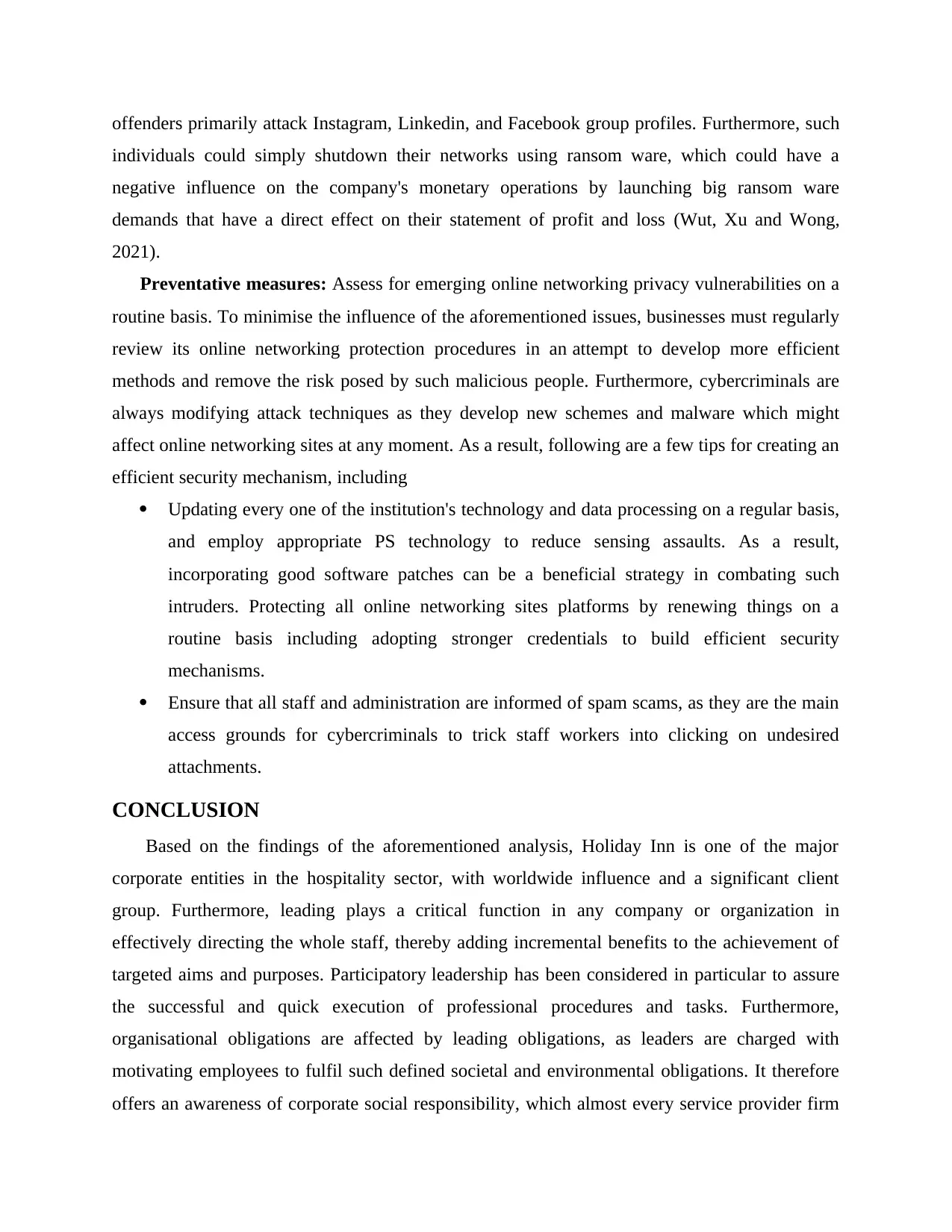
offenders primarily attack Instagram, Linkedin, and Facebook group profiles. Furthermore, such
individuals could simply shutdown their networks using ransom ware, which could have a
negative influence on the company's monetary operations by launching big ransom ware
demands that have a direct effect on their statement of profit and loss (Wut, Xu and Wong,
2021).
Preventative measures: Assess for emerging online networking privacy vulnerabilities on a
routine basis. To minimise the influence of the aforementioned issues, businesses must regularly
review its online networking protection procedures in an attempt to develop more efficient
methods and remove the risk posed by such malicious people. Furthermore, cybercriminals are
always modifying attack techniques as they develop new schemes and malware which might
affect online networking sites at any moment. As a result, following are a few tips for creating an
efficient security mechanism, including
Updating every one of the institution's technology and data processing on a regular basis,
and employ appropriate PS technology to reduce sensing assaults. As a result,
incorporating good software patches can be a beneficial strategy in combating such
intruders. Protecting all online networking sites platforms by renewing things on a
routine basis including adopting stronger credentials to build efficient security
mechanisms.
Ensure that all staff and administration are informed of spam scams, as they are the main
access grounds for cybercriminals to trick staff workers into clicking on undesired
attachments.
CONCLUSION
Based on the findings of the aforementioned analysis, Holiday Inn is one of the major
corporate entities in the hospitality sector, with worldwide influence and a significant client
group. Furthermore, leading plays a critical function in any company or organization in
effectively directing the whole staff, thereby adding incremental benefits to the achievement of
targeted aims and purposes. Participatory leadership has been considered in particular to assure
the successful and quick execution of professional procedures and tasks. Furthermore,
organisational obligations are affected by leading obligations, as leaders are charged with
motivating employees to fulfil such defined societal and environmental obligations. It therefore
offers an awareness of corporate social responsibility, which almost every service provider firm
individuals could simply shutdown their networks using ransom ware, which could have a
negative influence on the company's monetary operations by launching big ransom ware
demands that have a direct effect on their statement of profit and loss (Wut, Xu and Wong,
2021).
Preventative measures: Assess for emerging online networking privacy vulnerabilities on a
routine basis. To minimise the influence of the aforementioned issues, businesses must regularly
review its online networking protection procedures in an attempt to develop more efficient
methods and remove the risk posed by such malicious people. Furthermore, cybercriminals are
always modifying attack techniques as they develop new schemes and malware which might
affect online networking sites at any moment. As a result, following are a few tips for creating an
efficient security mechanism, including
Updating every one of the institution's technology and data processing on a regular basis,
and employ appropriate PS technology to reduce sensing assaults. As a result,
incorporating good software patches can be a beneficial strategy in combating such
intruders. Protecting all online networking sites platforms by renewing things on a
routine basis including adopting stronger credentials to build efficient security
mechanisms.
Ensure that all staff and administration are informed of spam scams, as they are the main
access grounds for cybercriminals to trick staff workers into clicking on undesired
attachments.
CONCLUSION
Based on the findings of the aforementioned analysis, Holiday Inn is one of the major
corporate entities in the hospitality sector, with worldwide influence and a significant client
group. Furthermore, leading plays a critical function in any company or organization in
effectively directing the whole staff, thereby adding incremental benefits to the achievement of
targeted aims and purposes. Participatory leadership has been considered in particular to assure
the successful and quick execution of professional procedures and tasks. Furthermore,
organisational obligations are affected by leading obligations, as leaders are charged with
motivating employees to fulfil such defined societal and environmental obligations. It therefore
offers an awareness of corporate social responsibility, which almost every service provider firm
Paraphrase This Document
Need a fresh take? Get an instant paraphrase of this document with our AI Paraphraser
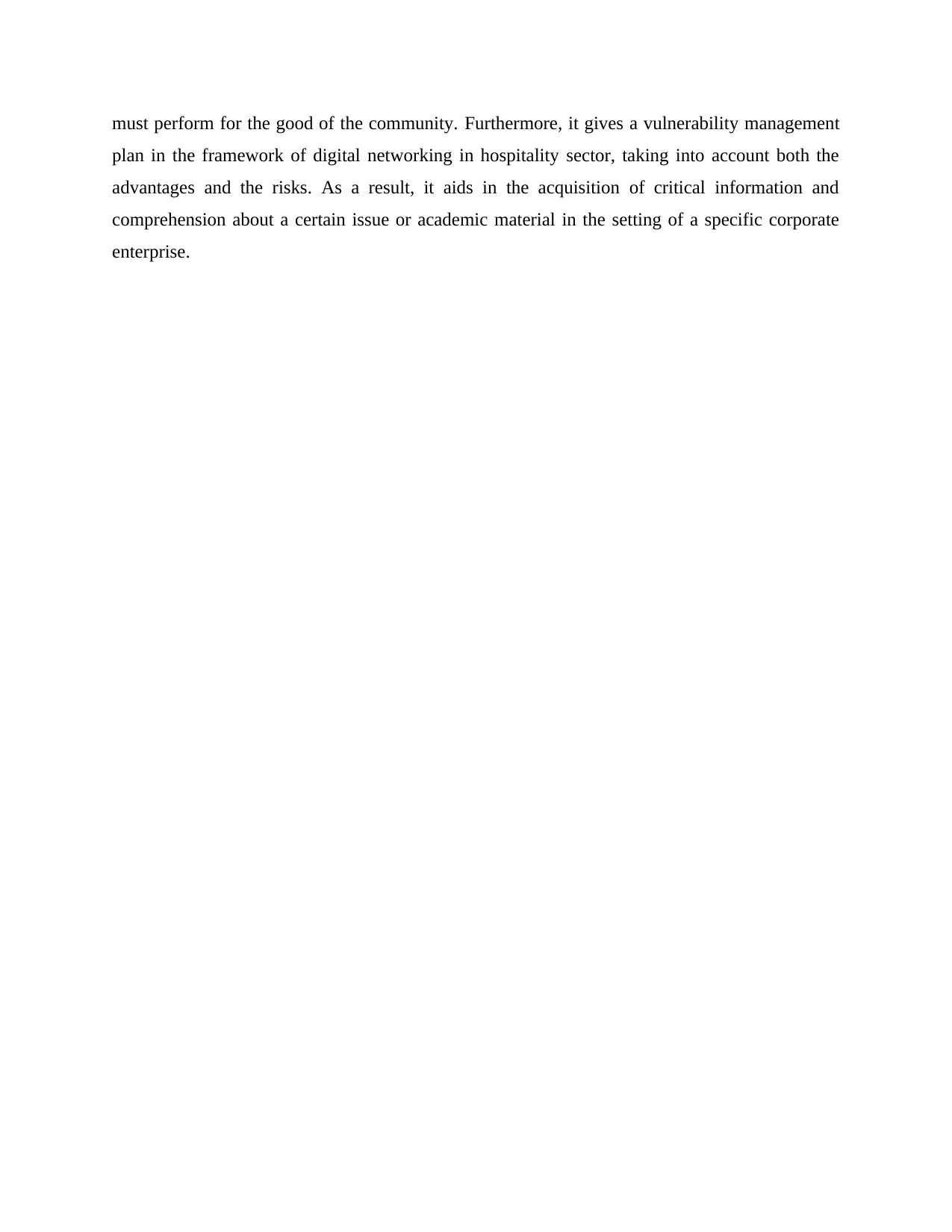
must perform for the good of the community. Furthermore, it gives a vulnerability management
plan in the framework of digital networking in hospitality sector, taking into account both the
advantages and the risks. As a result, it aids in the acquisition of critical information and
comprehension about a certain issue or academic material in the setting of a specific corporate
enterprise.
plan in the framework of digital networking in hospitality sector, taking into account both the
advantages and the risks. As a result, it aids in the acquisition of critical information and
comprehension about a certain issue or academic material in the setting of a specific corporate
enterprise.
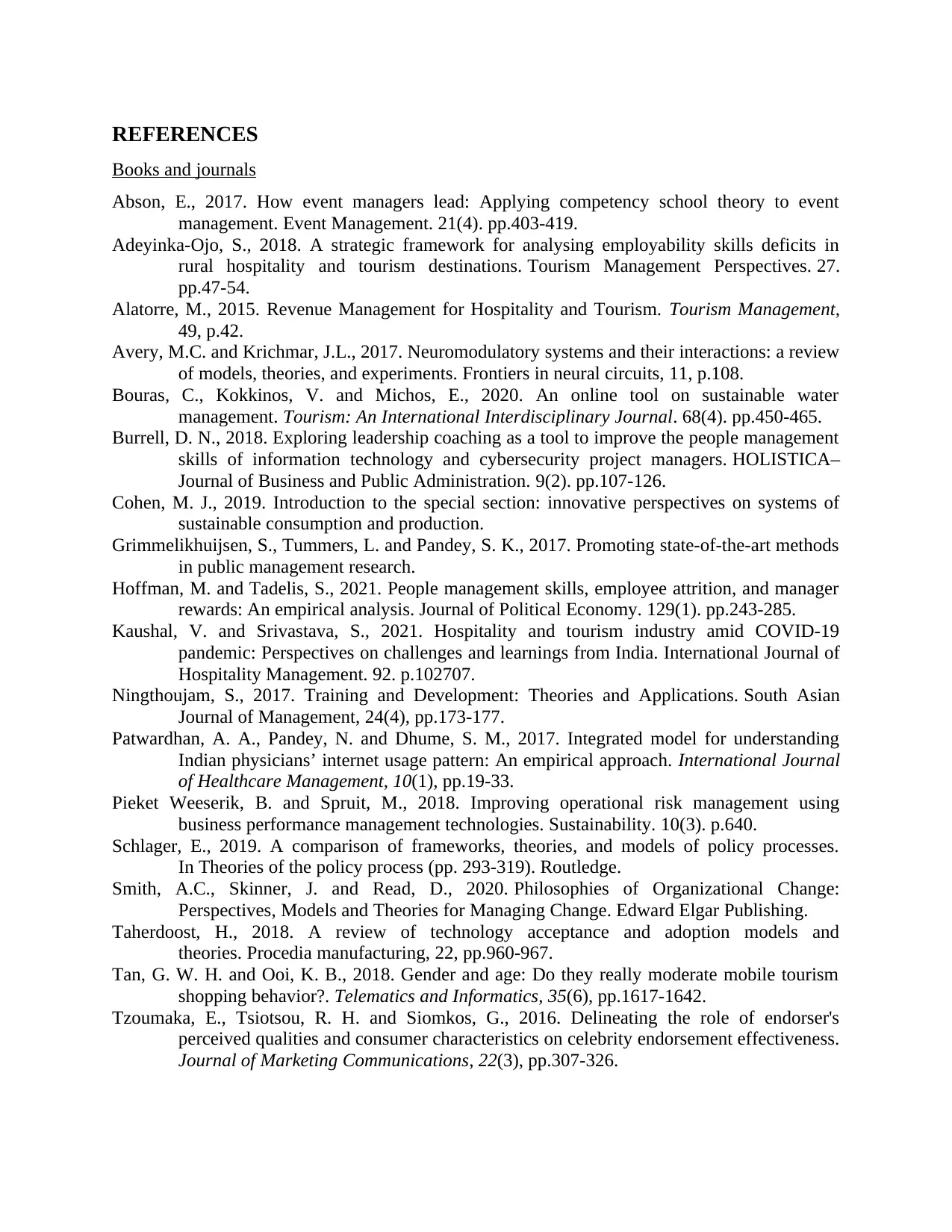
REFERENCES
Books and journals
Abson, E., 2017. How event managers lead: Applying competency school theory to event
management. Event Management. 21(4). pp.403-419.
Adeyinka-Ojo, S., 2018. A strategic framework for analysing employability skills deficits in
rural hospitality and tourism destinations. Tourism Management Perspectives. 27.
pp.47-54.
Alatorre, M., 2015. Revenue Management for Hospitality and Tourism. Tourism Management,
49, p.42.
Avery, M.C. and Krichmar, J.L., 2017. Neuromodulatory systems and their interactions: a review
of models, theories, and experiments. Frontiers in neural circuits, 11, p.108.
Bouras, C., Kokkinos, V. and Michos, E., 2020. An online tool on sustainable water
management. Tourism: An International Interdisciplinary Journal. 68(4). pp.450-465.
Burrell, D. N., 2018. Exploring leadership coaching as a tool to improve the people management
skills of information technology and cybersecurity project managers. HOLISTICA–
Journal of Business and Public Administration. 9(2). pp.107-126.
Cohen, M. J., 2019. Introduction to the special section: innovative perspectives on systems of
sustainable consumption and production.
Grimmelikhuijsen, S., Tummers, L. and Pandey, S. K., 2017. Promoting state-of-the-art methods
in public management research.
Hoffman, M. and Tadelis, S., 2021. People management skills, employee attrition, and manager
rewards: An empirical analysis. Journal of Political Economy. 129(1). pp.243-285.
Kaushal, V. and Srivastava, S., 2021. Hospitality and tourism industry amid COVID-19
pandemic: Perspectives on challenges and learnings from India. International Journal of
Hospitality Management. 92. p.102707.
Ningthoujam, S., 2017. Training and Development: Theories and Applications. South Asian
Journal of Management, 24(4), pp.173-177.
Patwardhan, A. A., Pandey, N. and Dhume, S. M., 2017. Integrated model for understanding
Indian physicians’ internet usage pattern: An empirical approach. International Journal
of Healthcare Management, 10(1), pp.19-33.
Pieket Weeserik, B. and Spruit, M., 2018. Improving operational risk management using
business performance management technologies. Sustainability. 10(3). p.640.
Schlager, E., 2019. A comparison of frameworks, theories, and models of policy processes.
In Theories of the policy process (pp. 293-319). Routledge.
Smith, A.C., Skinner, J. and Read, D., 2020. Philosophies of Organizational Change:
Perspectives, Models and Theories for Managing Change. Edward Elgar Publishing.
Taherdoost, H., 2018. A review of technology acceptance and adoption models and
theories. Procedia manufacturing, 22, pp.960-967.
Tan, G. W. H. and Ooi, K. B., 2018. Gender and age: Do they really moderate mobile tourism
shopping behavior?. Telematics and Informatics, 35(6), pp.1617-1642.
Tzoumaka, E., Tsiotsou, R. H. and Siomkos, G., 2016. Delineating the role of endorser's
perceived qualities and consumer characteristics on celebrity endorsement effectiveness.
Journal of Marketing Communications, 22(3), pp.307-326.
Books and journals
Abson, E., 2017. How event managers lead: Applying competency school theory to event
management. Event Management. 21(4). pp.403-419.
Adeyinka-Ojo, S., 2018. A strategic framework for analysing employability skills deficits in
rural hospitality and tourism destinations. Tourism Management Perspectives. 27.
pp.47-54.
Alatorre, M., 2015. Revenue Management for Hospitality and Tourism. Tourism Management,
49, p.42.
Avery, M.C. and Krichmar, J.L., 2017. Neuromodulatory systems and their interactions: a review
of models, theories, and experiments. Frontiers in neural circuits, 11, p.108.
Bouras, C., Kokkinos, V. and Michos, E., 2020. An online tool on sustainable water
management. Tourism: An International Interdisciplinary Journal. 68(4). pp.450-465.
Burrell, D. N., 2018. Exploring leadership coaching as a tool to improve the people management
skills of information technology and cybersecurity project managers. HOLISTICA–
Journal of Business and Public Administration. 9(2). pp.107-126.
Cohen, M. J., 2019. Introduction to the special section: innovative perspectives on systems of
sustainable consumption and production.
Grimmelikhuijsen, S., Tummers, L. and Pandey, S. K., 2017. Promoting state-of-the-art methods
in public management research.
Hoffman, M. and Tadelis, S., 2021. People management skills, employee attrition, and manager
rewards: An empirical analysis. Journal of Political Economy. 129(1). pp.243-285.
Kaushal, V. and Srivastava, S., 2021. Hospitality and tourism industry amid COVID-19
pandemic: Perspectives on challenges and learnings from India. International Journal of
Hospitality Management. 92. p.102707.
Ningthoujam, S., 2017. Training and Development: Theories and Applications. South Asian
Journal of Management, 24(4), pp.173-177.
Patwardhan, A. A., Pandey, N. and Dhume, S. M., 2017. Integrated model for understanding
Indian physicians’ internet usage pattern: An empirical approach. International Journal
of Healthcare Management, 10(1), pp.19-33.
Pieket Weeserik, B. and Spruit, M., 2018. Improving operational risk management using
business performance management technologies. Sustainability. 10(3). p.640.
Schlager, E., 2019. A comparison of frameworks, theories, and models of policy processes.
In Theories of the policy process (pp. 293-319). Routledge.
Smith, A.C., Skinner, J. and Read, D., 2020. Philosophies of Organizational Change:
Perspectives, Models and Theories for Managing Change. Edward Elgar Publishing.
Taherdoost, H., 2018. A review of technology acceptance and adoption models and
theories. Procedia manufacturing, 22, pp.960-967.
Tan, G. W. H. and Ooi, K. B., 2018. Gender and age: Do they really moderate mobile tourism
shopping behavior?. Telematics and Informatics, 35(6), pp.1617-1642.
Tzoumaka, E., Tsiotsou, R. H. and Siomkos, G., 2016. Delineating the role of endorser's
perceived qualities and consumer characteristics on celebrity endorsement effectiveness.
Journal of Marketing Communications, 22(3), pp.307-326.
You're viewing a preview
Unlock full access by subscribing today!
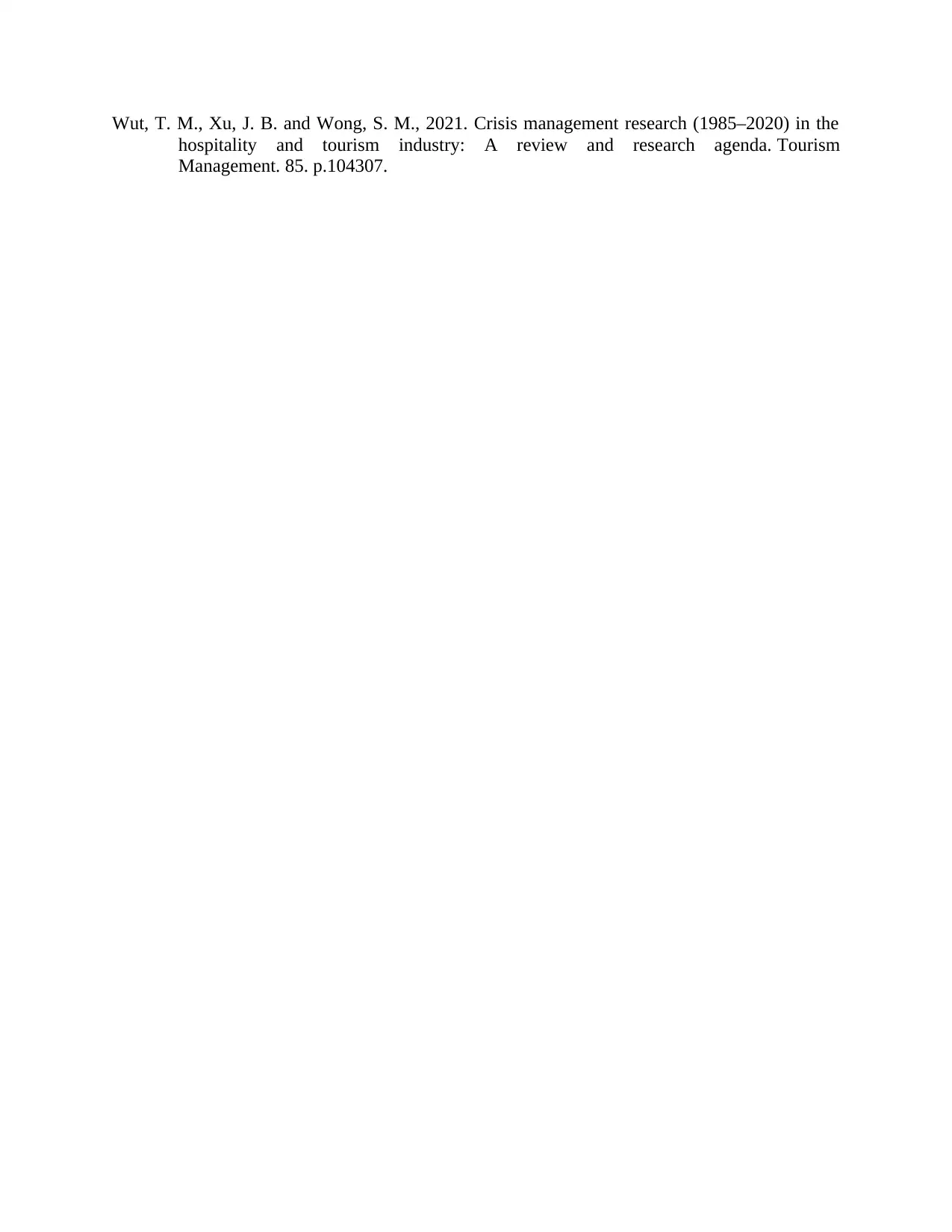
Wut, T. M., Xu, J. B. and Wong, S. M., 2021. Crisis management research (1985–2020) in the
hospitality and tourism industry: A review and research agenda. Tourism
Management. 85. p.104307.
hospitality and tourism industry: A review and research agenda. Tourism
Management. 85. p.104307.
1 out of 16
Related Documents
Your All-in-One AI-Powered Toolkit for Academic Success.
+13062052269
info@desklib.com
Available 24*7 on WhatsApp / Email
![[object Object]](/_next/static/media/star-bottom.7253800d.svg)
Unlock your academic potential
© 2024 | Zucol Services PVT LTD | All rights reserved.
